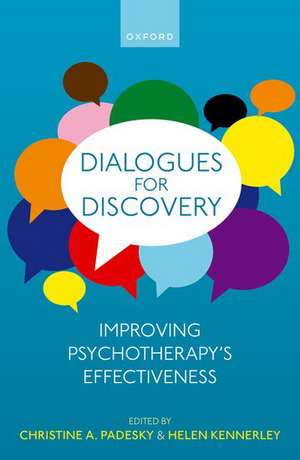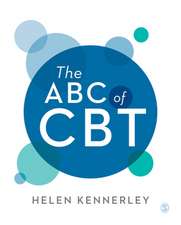Dialogues for Discovery: Improving Psychotherapy's Effectiveness
Editat de Christine Padesky, Helen Kennerleyen Limba Engleză Paperback – 24 aug 2023
Preț: 256.84 lei
Preț vechi: 331.89 lei
-23% Nou
Puncte Express: 385
Preț estimativ în valută:
49.15€ • 52.55$ • 40.98£
49.15€ • 52.55$ • 40.98£
Carte disponibilă
Livrare economică 17-22 martie
Livrare express 12-18 martie pentru 105.05 lei
Preluare comenzi: 021 569.72.76
Specificații
ISBN-13: 9780199586981
ISBN-10: 0199586985
Pagini: 560
Dimensiuni: 150 x 230 x 30 mm
Greutate: 0.81 kg
Editura: OUP OXFORD
Colecția OUP Oxford
Locul publicării:Oxford, United Kingdom
ISBN-10: 0199586985
Pagini: 560
Dimensiuni: 150 x 230 x 30 mm
Greutate: 0.81 kg
Editura: OUP OXFORD
Colecția OUP Oxford
Locul publicării:Oxford, United Kingdom
Recenzii
A terrific book, the fruit of both editors' years of deepening understanding, innovative clinical practice, self-reflection and growing expertise. Similar expertise illuminates chapters by CBT specialists addressing specific client groups and problems. Lively and engaging, the text skillfully embodies the curiosity, empathy, respect and collaboration at the heart of this approach. And readers can join this journey, using chapter by chapter learning activities and reflection sheets. A truly significant addition to the literature on the process of effective learning in psychotherapy.
Helping people gain insights into the nature of their minds and its different brain states is common to psychotherapies, but it is no easy task. In their exciting new book international world leading cognitive therapists bring their extensive experience together to guide the reader through the use of Socratic forms of dialogue to support those therapeutic aims. The book is full of signposts of opportunities as well as roadblocks and potential traps and how to deal with them. In addition to revelation, the approach illustrated helps clients discover inner strengths and meanings. Accessible, clearly written and full of fascinating clinical insights, tips and guides, this will become a much valued book for experienced and new therapists alike regardless of their school of therapy.
Although the use of Socratic dialogue and guided discovery have long been encouraged in psychotherapy, it is only in the last decade or so that enough data has gathered to give clear clinical guidance about their use. Dialogues for Discovery is an exceptional resource for therapists seeking to guide their clients towards discovery and hope. This book provides practical guidance and strategies for managing common therapy impasses and dilemmas, such as low client motivation, inflexible beliefs, and alliance ruptures. It is a clinically sophisticated guide that is grounded in empirical evidence and theoretical knowledge.
Rarely are psychotherapists given a gift consisting of a combination of scholarship, clinical acumen and practical user friendly teaching clinical case vignettes. Kudos to Christine Padesky and Helen Kennerley and their clinically astute colleagues for demonstrating how to use Socratic Dialogue and guided discovery procedures in psychotherapy. This book should be read, studied and implemented by all health care providers.
Dialogues for Discovery is revolutionary. It presents a model that will resonate with therapists from all schools of therapy who want to ask more effective questions and listen/respond to client answers in ways that will help clients make active discoveries in therapy. Amply illustrated with case examples and pragmatic guidance, Padesky and Kennerley show us how placing curiosity and collaboration at the forefront of the therapeutic encounter leads to whole shifts in perspective rather than merely changing someone's mind.
Dialogues for Discovery-improving psychotherapy's effectiveness is a book about guided discovery using Socratic dialogue in psychotherapy and supervision... This book is particularly appealing, because of the number of clinical illustrations provided. These show in detail how Socratic dialogue can be developed so that it can both help the client and be adjusted to our personal style. Reading the book it is both apparent and inspiring that each author has their own personal style. They all describe case examples using their own "Therapist's voice" and we learn that there are so many variations and ways to develop the Socratic dialogue to make it one's own....I am pleased to have this book on my bookshelf and will return to it and learn more as I meet new challenges.
This is a useful handbook for clinicians of all experience levels and for clinicians working with a variety of clinical concerns. The material is both easy to understand and enlightening, making an important yet nebulous concept like the Socratic Method and guided discovery in psychotherapy clear, exciting, and accessible. Given the importance of these methods in theoretical models of CBT and in empirical research on psychotherapy processes, this handbook will be useful and appropriate for trainees, entrylevel clinicians, and seasoned clinicians alike who are interested in making their clinical work more impactful for the clients they work with.
Helping people gain insights into the nature of their minds and its different brain states is common to psychotherapies, but it is no easy task. In their exciting new book international world leading cognitive therapists bring their extensive experience together to guide the reader through the use of Socratic forms of dialogue to support those therapeutic aims. The book is full of signposts of opportunities as well as roadblocks and potential traps and how to deal with them. In addition to revelation, the approach illustrated helps clients discover inner strengths and meanings. Accessible, clearly written and full of fascinating clinical insights, tips and guides, this will become a much valued book for experienced and new therapists alike regardless of their school of therapy.
Although the use of Socratic dialogue and guided discovery have long been encouraged in psychotherapy, it is only in the last decade or so that enough data has gathered to give clear clinical guidance about their use. Dialogues for Discovery is an exceptional resource for therapists seeking to guide their clients towards discovery and hope. This book provides practical guidance and strategies for managing common therapy impasses and dilemmas, such as low client motivation, inflexible beliefs, and alliance ruptures. It is a clinically sophisticated guide that is grounded in empirical evidence and theoretical knowledge.
Rarely are psychotherapists given a gift consisting of a combination of scholarship, clinical acumen and practical user friendly teaching clinical case vignettes. Kudos to Christine Padesky and Helen Kennerley and their clinically astute colleagues for demonstrating how to use Socratic Dialogue and guided discovery procedures in psychotherapy. This book should be read, studied and implemented by all health care providers.
Dialogues for Discovery is revolutionary. It presents a model that will resonate with therapists from all schools of therapy who want to ask more effective questions and listen/respond to client answers in ways that will help clients make active discoveries in therapy. Amply illustrated with case examples and pragmatic guidance, Padesky and Kennerley show us how placing curiosity and collaboration at the forefront of the therapeutic encounter leads to whole shifts in perspective rather than merely changing someone's mind.
Dialogues for Discovery-improving psychotherapy's effectiveness is a book about guided discovery using Socratic dialogue in psychotherapy and supervision... This book is particularly appealing, because of the number of clinical illustrations provided. These show in detail how Socratic dialogue can be developed so that it can both help the client and be adjusted to our personal style. Reading the book it is both apparent and inspiring that each author has their own personal style. They all describe case examples using their own "Therapist's voice" and we learn that there are so many variations and ways to develop the Socratic dialogue to make it one's own....I am pleased to have this book on my bookshelf and will return to it and learn more as I meet new challenges.
This is a useful handbook for clinicians of all experience levels and for clinicians working with a variety of clinical concerns. The material is both easy to understand and enlightening, making an important yet nebulous concept like the Socratic Method and guided discovery in psychotherapy clear, exciting, and accessible. Given the importance of these methods in theoretical models of CBT and in empirical research on psychotherapy processes, this handbook will be useful and appropriate for trainees, entrylevel clinicians, and seasoned clinicians alike who are interested in making their clinical work more impactful for the clients they work with.
Notă biografică
Christine A. Padesky PhD is a licensed clinical psychologist, a leading cognitive behavior therapy (CBT) innovator, consultant to therapists and clinics worldwide, and co-creator of Strengths-Based CBT. Her awards include the Lifetime Achievement Award from the Academy of Cognitive and Behavioral Therapies. Voted the most influential international CBT psychotherapist by the British Association of Behavioural and Cognitive Psychotherapies. Her best-selling books include: Mind Over Mood, The Clinician's Guide to CBT Using Mind Over Mood, and Collaborative Case Conceptualization.Helen Kennerley took a D.Phil from the University of Oxford, later becoming an NHS Consultant Clinical Psychologist. She was a founding member of the Oxford Cognitive Therapy Centre, and the director of its Advanced Cognitive Therapy Studies and MSc in CBT. She now leads the OCTC/University of Oxford training in Psychological Trauma & Personality Development and in Supervision & Training. Her research includes: post-natal mood changes, anxiety management, sequelae and treatment of childhood trauma. Until 2021, she also worked with the MOD. She was shortlisted as most influential UK CBT psychotherapist by the British Association of Behavioural and Cognitive Psychotherapies.













